2019
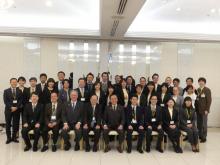
Report on Successful Local Case Models for Health Systems Management of Dementia
Dementia is an emerging global health issue, predicted to affect over 150 million people by 2050, while associated costs of care are likely to exceed US$ 2 trillion USD by 2030. With its ageing population, Japan is testing best practices for earlier detection and intervention in every region at community and municipal level.
In March 2019, the WHO Kobe Centre, in collaboration with Kanagawa Prefecture, organised a workshop in Yokohama for over 50 representatives from government, academia and civil society and private sector to share best practice insights on “Translating Evidence into Policy: Facilitating successful local case models of health system management for dementia.”
The discussions involved comparing problems and solutions across regions of Japan, methods for adapting experiences, and future collaboration. Participants highlighted the importance of including dementia patients in creating and implementing initiatives, and the need for cooperation with all stakeholders.
A key outcome of the workshop was an agreement that best practices should be shared proactively domestically and abroad, and that evidence should be based on scientific research.
Click here for the Workshop Report and Japan’s community-based best practices.
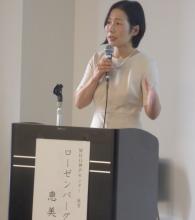
“Shaping societies for well-being (happiness and health) ~ 10 years of progress and future vision”
Dr Megumi Rosenberg, Technical Officer of WKC, was invited to speak at this symposium in Nagoya, Japan which commemorated the 10th anniversary of the Center for Well-being Society (CWS) of Nihon Fukushi University, the 20th anniversary of the Japan Gerontological Evaluation Study (JAGES) and the appointment of Dr Masashige Saito, the new Director of CWS.
Dr Rosenberg spoke about the various contributions of CWS and its flagship project, JAGES, to global health through their engagement with WHO over the past 10 years. Specific examples included the collaborations to develop the JAGES health equity assessment and data visualization tool[1] and the WHO Age-friendly City indicator guide[2]. She also highlighted the recent publication by WKC on the lessons learned from JAGES about translating research on ageing and health into policies and practices to promote healthy ageing and health equity[3]. WKC is supporting new research to apply the methods and lessons of the JAGES study in specific areas of Malaysia and Myanmar where rapid aging is expected, to promote universal health coverage.
Other speakers were Dr Katsunori Kondo of Chiba University and Founding Director of CWS, Dr Toshiyuki Ojima of Hamamatsu Medical University, a key collaborator in JAGES, and Dr Masashige Saito of Nihon Fukushi University and the new Director of CWS.
Each reflected on how CWS/JAGES broke ground in Japan by revealing socially determined health inequalities among the older population using social epidemiological methods and influencing local and national health policies to address this problem. Dr Saito also shared his new vision for CWS which will emphasize quantitative research to study social isolation and other social phenomena that are critical to understanding wellbeing.
The event was organized by the Center for Well-being and Society, Nihon Fukushi University, with support from the Japan Agency for Gerontological Evaluation Study. It was attended by a diverse audience including members of academia, local government, private sector, and media.
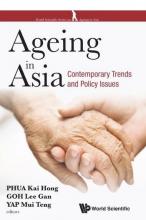
WKC book chapter: “Technology and social innovations for an ageing Asia”
Increasing longevity has contributed to unprecedented global economic growth and opportunities for personal fulfilment. The speed of ageing in Asia currently outstrips all other world regions. Yet a key challenge for societies is to change negative assumptions and perceptions around what it means to be ‘old’.
Paul Kowal, Loïc Garçon, Alex Ross and Paul Ong of WKC have written a clear, thought-provoking chapter in a new book, Ageing in Asia, published by World Scientific. The book provides examples of best practices and case studies of leading social systems and programmes on ageing and related developments in Asia.
The WKC authors explore how technology and social innovation can enhance independence, functionality and quality of life of older adults, and impact positively on wellbeing and dignity. They cite best practice examples in Asian countries, and reflect that “silver surfers” are challenging perceptions about the adoption of technology by older persons.
Further research is needed for appropriately designed mobile health (mHealth) technologies, as well as on ethics, technology and its capacity to replace more human aspects of care.
The book chapter is accessible following this link: https://www.worldscientific.com/worldscibooks/10.1142/10585
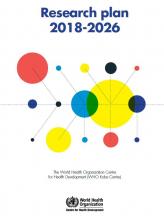
WKC releases new research plan for 2018-26
WKC releases new research plan for 2018-26
The WHO Centre for Development in Kobe (WKC) has developed a new research plan to guide the third decade of its work to 2026, in alignment with WHO’s General Programme of Work and the Centre’s agreement with the Kobe Group.
The plan provides a cohesive programme of research under three main research themes:
- Service delivery and sustainable financing in the light of population ageing to accelerate health coverage (UHC) in countries
- Metrics and measurement to monitor progress towards UHC in the context of population ageing
- Health emergencies and disaster risk management to inform countries about responding to health emergencies and build resilient health systems that respond to the needs of older persons who are most disadvantaged during health emergencies.
Lessons learned from Japan is a cross-cutting theme across all three research areas. Japan has been at the forefront of managing health systems responses to population ageing and responding to the needs of older persons. The research plan also incorporates innovations, defined as not only new products and technologies, but also new ways of solving health problems.
To accompany the research strategy, WKC has developed a quality assurance plan to ensure the highest possible quality research products.
“The vision of the WKC strategy and research plan is to be a global research centre by studying innovations to advance sustainable universal health coverage. We work with researchers both globally as partnering with academics within the Kansai region in Japan,” said WKC Director, Dr Sarah L Barber.
“Our goal is to carry out research that can help countries develop policies that will contribute to better coverage and financial protection for people at all ages.”
Find the Research Plan and Quality Assurance Plan here: Research Plan & Quality Assurance Plan
Click here for a short video on the Research Plan.
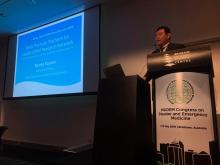
Dr Ryoma Kayano presents at World Association for Disaster and Emergency Medicine Congress 2019
Dr Ryoma Kayano was invited to present at the World Association for Disaster and Emergency Medicine (WADEM) Congress 2019 held at Brisbane, Australia. He presented at the session to introduce the effort to implement the Sendai Framework for Disaster Risk Reduction 2015-2030 by WHO and partners, including the development of the concept of Health Emergency and Disaster Risk Management (Health-EDRM) and the establishment of a global research network, WHO Thematic Platform for Health-EDRM Research Network (TPRN).
"The Sendai Framework for Disaster Risk Reduction 2015-2030 puts health at the centre of local, national and global action on managing risks assosciated with emergencies. The Thematic Platform was established in order for local, national and international partners to collaborate on actions to reduce deaths, injuries, illness, disability and other health consequences from emergencies, disasters and other crises, and to building the resilience of health systems," according to Professor Virginia Murray, Public Health England (PHE), the co-chair of TPRN.
"WHO established TPRN for global research collaboration towards systematic improvement of scientific evidence on Health-EDRM. It is now inviting interested participants for future contribution and collaboration," Dr Kayano explained.
The session was organized by the WHO Kobe Centre, WHO Western Pacific Regional Office, WHO African Regional Office and Public Heatlh England.
The WHO Kobe Centre acts as the secretariat of the TPRN. The registration form and operation plan for TPRN will be available online shortly.
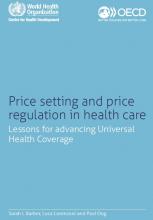
New WKC-OECD Study released
The WHO Centre for Health Development in Kobe (WKC) and the Organisation for Economic Co-operation and Development (OECD) have released a novel study on price setting and price regulation in health care to support countries to accelerate progress towards universal health coverage (UHC).
Researchers completed case studies from nine settings*to generate lessons learned in prices setting and regulation, particularly for low and middle-income countries, and to identify areas for future research.
“Pricing and payment are important policy tools to move towards UHC. Pricing policies send a clear message to practitioners and patients about what healthcare services are to be delivered and how much healthcare providers are to be paid optimally. Where prices are set too high or too low, health care providers may compensate by providing additional unnecessary care or insufficient quality,” said study co-ordinator and WKC Director, Dr Sarah Barber.
In comparing the ways in which prices are set, the study found that unilateral price setting by a regulator eliminates variation in prices unrelated to quality and helps to reduce the growth in healthcare costs, compared with individual price negotiations between health insurers and health service providers. Although many of the case studies focused on developed health care settings, all policy makers continue to strive to use prices as a means to provide incentives for drive quality, efficiency and health outcomes.
For instance, most of the countries studied adjusted their prices for health care providers in rural and remote areas, or those treating disproportionately high numbers of low-income or high-cost patients to ensure fair coverage and access. In Japan, the Republic of Korea, Germany, Malaysia, and Thailand, providers are prohibited from charging prices higher than the regulated prices. This protects people from unexpected out-of-pocket costs at the point of payment.
The research is particularly valuable for low- and middle-income countries that are increasing their public funding to health. Lessons learned include the need to invest in data infrastructure and institutional capacities which can generate context-specific evidence to guide policies, planning implementation changes in sequence, using prices to drive health policy goals, and setting up monitoring and evaluation systems to identify modifications needed to attain health objectives.
This unique work will be of interest to policy makers and researchers working on health systems and universal health coverage. It can be downloaded from the WKC website: https://extranet.who.int/kobe_centre/en/project-details/Price_setting_health_care
*Australia, England, France, Germany, Japan, Malaysia, Republic of Korea, Thailand, United States of America (and the State of Maryland)
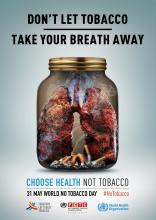
World No Tobacco Day 2019 - Message of Dr Sarah Barber, Director of the WHO Centre for Health Development (WHO Kobe Centre)
On 31 May each year, the World Health Organization and its partners celebrate World No Tobacco Day to raise awareness that tobacco use and exposure to second-hand smoke are harmful, deadly, but completely preventable causes of death and disease. This year focuses on the threat of tobacco on lung health for everyone – not just smokers.
Tobacco smoking is the most common cause of lung cancer, resulting in about 1.2 million lung cancer deaths globally every year. Smokers are 22 times more likely to develop lung cancer than non-smokers, and twice as likely to develop TB. More than 20% of new TB cases around the world may be attributable to tobacco.
Tobacco smoke contributes to indoor air pollution. Smoke from the burning end of a cigarette, as well as exhaled smoke, is known as second-hand smoke. Non-smokers who breathe in this smoke risk getting lung cancer, chronic obstructive pulmonary disease, tuberculosis and asthma. Smokers’ children suffer reduced lung function which can affect them in adulthood through chronic respiratory disorders.
Just a single breath of tobacco smoke is enough to start damaging the lungs. Inhaling tobacco smoke paralyses the structures in the airways that clear mucus and dirt, allowing toxins in the smoke to enter the lungs more easily. In Japan, where around 18% of the population smoke, around 15 000 people are killed every year from second-hand smoke.
But it is never too late to quit smoking. Lung function improves within just two weeks of quitting tobacco use.
Japan recently tightened up its indoor smoking regulations. From July 2019, smoking will be banned indoors in schools, hospitals, government and children’s facilities. Several municipalities such as Tokyo, Chiba City, Shizuoka Prefecture and Hokkaido are implementing tougher smoke-free measures to protect their citizens. Increasingly, businesses are choosing to promote health and not tobacco by banning smoking in their workplaces and helping workers to quit smoking.
These are important steps towards protecting people from harmful second-hand smoke – but they do not go far enough. Around 55% of smaller bars and restaurants in Japan are exempt because of their size. This means that customers, families and workers will still be exposed to tobacco smoke. Designated smoking rooms, which are ineffective in protecting people from second-hand smoke, will still be allowed in public spaces such as workplaces, hotels and trains.
Japan is one of the fastest growing markets for e-cigarettes and heated tobacco products (HTPs). WHO recommends that HTPs should be regulated in the same manner as other tobacco products, and that bystanders be protected from exposure to second-hand emissions from HTPs and e-cigarettes.
Japan will soon be showcasing its culture and hospitality at the 2019 Rugby World Cup. Many of the nations playing have introduced indoor smoke-free laws which have been good for health and good for business. Research has found that indoor smoking bans have either a positive or no effect on business in bars and restaurants.
Japan has proven itself to be a global leader, particularly in its progress towards universal health coverage to ensure that all its citizens can access quality health care. The 2019 Rugby World Cup and the 2020 Olympics are golden opportunities for Japan to expand and accelerate its tobacco-free laws. Implementing and enforcing the most effective tobacco control policies and laws is critical for lung health of all people - not just smokers.
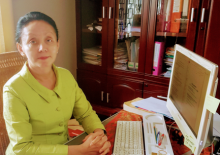
Lao PDR conducts first national survey on dementia to guide evidence-based policies
The Lao People’s Democratic Republic (PDR) is launching a national survey to assess adults over 60 with low cognitive function, as part of two year project funded by WHO’s Kobe Centre for Health Development (WKC).
Principal Investigator, Dr Sengchanh Kounnavong, Director-General of the Lao Tropical and Public Health Institute in the Ministry of Health, explains more about the study:
“Dementia is a growing public health problem around the world, and is a heavy burden for those living with the disease, their families and society. In Lao PDR, the elderly population is changing quickly and we need to prepare for that.
In 2017, we conducted a pilot study using the revised Hasegawa’s Dementia Scale to document the percentage of the elderly with reduced cognitive function in the general population. We found very interesting results, including that among superficially healthy elderly individuals residing with their families, those with reduced cognitive function were more common in women and in rural areas.
We do not have any national data, so the invitation by the Kobe Centre to submit a proposal was a very good opportunity for us to gather evidence based data to revise our policies for the elderly, which were written a long time ago.
This will be a representative study, involving 2500 members of the population in rural and urban communities in the three regions of the country. The tools are currently being prepared, and we hope to collect data from October to December, and hope to already have data in January 2020.
The study team includes the curative department and the health insurance bureau, which will explore how health insurance can cover the elderly as part of our goal to offer universal health coverage to the whole population. Counterparts from the World Bank will also be available to assist with technical advice, along with the WKC technical team which will be monitoring the quality and timeliness of activities.
The study has important implications for Lao PDR to progress toward Universal Health Coverage. Right now, Lao government health sector reform is aiming for UHC for the whole population, including the elderly people. We do not have this yet. The study includes many questions on lifestyle (noncommunicable) diseases, and the data will give insights on how we can propose health insurance coverage for the elderly.
This research is important because the results will provide evidence for us to move forward with policy adaptations to improve the health and wellbeing of our elderly population.”
WHO recently issued new guidelines for reducing the risk of cognitive decline and dementia. Click here to read more: https://www.who.int/mental_health/neurology/dementia/guidelines_risk_reduction/en/
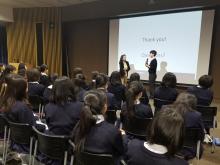
Dr Sarah Barber’s lecture to Fukiai Senior High School Students, 9 May 2019
“Who helps to implement Universal Health Coverage?”
This was one of the questions posed by Dr Sarah Barber, Director of the WHO Centre for Health Development in Kobe when she addressed around 80 international studies students at Fukiai Senior High School.
Fukiai High School is one of the World Wide Learning (WWL) base school in Japan which aim to cultivate global leaders from among the youth with an interest in social and international issues.
Dr Barber’s lecture focused on Universal Health Coverage (UHC) which is at the forefront of global health in the 21st century. UHC aims to ensure that all people obtain essential health services without suffering financial hardship when paying for them.
Currently, at least half the world’s population still do not have full access to essential health services. Nearly 100 million people become very poor – living on $1.90 / Y 200 or less a day – because they have to pay for health care.
Japan achieved universal health insurance coverage in 1961, but continues to work towards meeting the country’s changing health needs.
“To answer the question: Every government, organization and person has an important role in promoting the right to good health. Health is a human right, and UHC reflects the values of equity, fairness and social solidarity,” she told the students.
After the lecture, the students broke up into small groups to discuss tobacco control. This is a major public health problem globally and in Japan, where second hand smoke kills about 40 people every day. Students explored how to reduce tobacco use and smoking, and who the most important role players were to achieve this.
In closing, Dr Barber urged the youth to be aware of the health impacts of smoking, and to call for 100% smoke free policies in their communities and local governments, to protect themselves, their families and communities from second hand smoke.
WHO Kobe Centre receives funding from Hyogo Prefecture and Kobe City to conduct research about health systems and innovations, particularly around ageing populations. Engaging with the youth is a way to stimulate an interest in research and cultivate new ideas in tomorrow’s leaders.
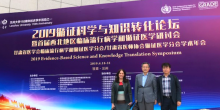
WKC Director presents at 2019 Evidence–Based Science and Knowledge Translation Symposium
On the 20th of April, Dr Sarah Barber was invited to present at the 2019 Evidence–Based Science and Knowledge Translation Symposium in collaboration with the WHO Collaborating Centre for Guideline Implementation and Knowledge Translation, Lanzhou University, China. She delivered an address on ‘Global health and evidence–based policy making’.
“Evidence-based policy making has the potential to help focus on interventions that have the greatest health gains. Global evidence and cost-effectiveness can be useful in considering evidence-based priorities and policy options,” she explained.
“Using evidence to inform global health policy is needed, but the policy process is complex. We can use evidence to inform global priorities, select the most cost- effective interventions, and also inform implementation.”
Dr Sarah Barber concluded by noting that institutional capacity is needed to evaluate the strength and limitations of the evidence, to identify the context under which policies would be successful, and to consult with stakeholders and the general public.

